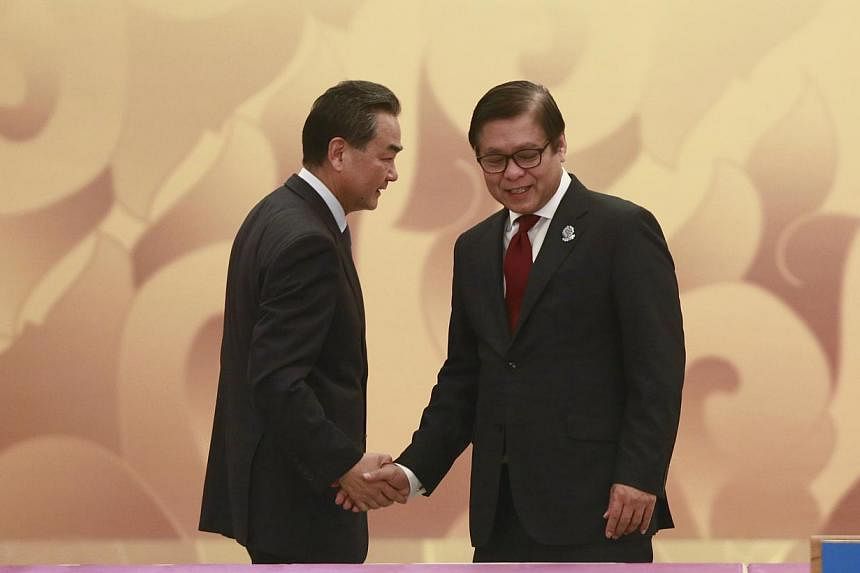''We're late,'' Chinese Foreign Minister Wang Yi said light-heartedly as he strode into a press conference with his Thai counterpart Sihasak Phuangketkeow in a large room full of journalists in the sprawling Myanmar International Convention Centre (MICC) in Naypyitaw last week.
Wang then put his arm firmly around the shoulders of the Thai foreign minister as they walked up to the podium to address the media.
Sihasak had been propelled into the role of acting foreign minister by Thailand's military which seized power on June 22, and only last week announced an interim, handpicked national assembly stuffed with military men. A new interim Cabinet is still to be announced.
In contrast to a frosty reaction from Washington, Beijing was among the first to recognise the military government, leading to speculation that Bangkok - a close US ally - may be driven into the arms of Beijing.
In such gestures as the Chinese minister's brotherly arm around Sihasak, lie clues to the dynamics of super powers and regional powers.
The next day, US Secretary of State John Kerry, when greeting Philippine Foreign Secretary Roberto del Rosario, came up behind him and gave his shoulders a brief squeeze and massage.
"This is how you can tell who among them are friends'' said an ambassador of one of the Asian countries present at the meetings.
Korean Foreign Minister Yun Byung se won friends when he walked into the East Asia Summit meeting last Saturday and walked around the room shaking hands affably with other foreign ministers.
It was a contrast, a diplomat said, to Japanese Foreign Minister Yumio Kishida, who was half an hour late for a photo opportunity with his counterparts.
Visibly irritated, according to some, Myanmar's Foreign Minister Wunna Maung Lwin, chairman and host of the meetings, waited but decided to go ahead with the picture, with a Japanese official standing in for the minister. Worse, said the diplomat, the Japanese minister walked in afterwards without bothering to show any contrition.
The reason for his delay? An unscheduled meeting with Kerry, the Japanese media reported.
In the context of prevailing tension between China and Japan, a meeting with Tokyo's ally the US trumped an Asean photo-op.
The mood and body language at the Asean meetings was friendly. A Philippine official though told The Straits Times that Cambodia attempted to water down language in the joint communiqué issued by the foreign ministers on the South China Sea.
Beijing claims almost the entire South China Sea, but parts of it are also claimed by four Asean countries - Vietnam, the Philippines, Malaysia and Brunei. Vietnam and the Philippines, in particular, have been at loggerheads with Beijing both at sea and in diplomatic meetings.
Cambodia's position recalled the 2012 debacle in Phnom Penh when the country, as Asean chair, virtually acted on behalf of China to block Asean consensus on the South China Sea, sabotaging the joint communiqué which for the first time in Asean history failed to be issued.
But the consensus held this time around. Myanmar's chairmanship was praised as neutral and even-handed. The joint communiqué was issued, although it came late because of a slow drafting process, officials said.
The Philippines considered it a "great achievement'' that Manila's three-point action plan for reducing tension and resolving disputes was mentioned in it, which means it will be discussed by senior officials, said one official.
This came even as the Chinese foreign minister appeared to shoot it down, accusing the Philippines of jumping directly to the third stage - arbitration. In May, Manila filed for arbitration at The Hague, which riled Beijing.
Philippine officials in Naypyitaw seemed hard pressed to explain the apparent anomaly pointed out by Mr Wang. But on Monday in Manila, Charles Jose, spokesman for the Philippines' department of foreign affairs, attempted a defence, telling journalists the three steps "could be held simultaneously, not necessarily consecutively".
With the tragedy of the shooting down of Malaysia Airlines flight MH17 last month, and the thorny issue of the South China Sea occupying their minds, the relative conviviality of the Asean meetings, in which all the foreign ministers know each other and meet often, was not as evident in the later meetings which included Asean dialogue partners - the East Asia Summit and the Asean Security Forum.
On one occasion, Mr Wang was kept waiting for a photo opportunity by Kerry. Looking slightly irritated, he told the US foreign secretary '"You're late!''. Kerry, looking sheepish, replied:"I am very, very sorry."
And as they proceeded to shake hands for the cameras, Kerry noticed some officials bustling about in the room and stuck his tongue out in a quizzical gesture.
A photographer caught that off guard - but human - moment in three days of meetings where public appearances and pronouncements were almost always couched in careful, guarded diplomatic jargon.



